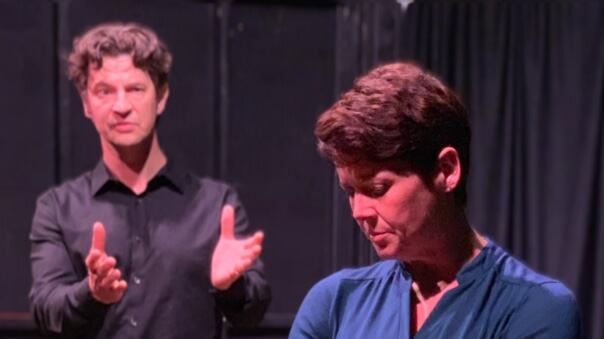Don't fault anyone for not wanting to see Twilight Theater Company's astounding production of Paula Vogel's How I Learned to Drive. While the play pairs some of Portland's gutsiest actors with one of the most provocative theatrical works of the '90s, it also offers a frank, visceral portrait of pedophilia. Some playgoers may feel the artistry on display is not significant enough to sit through scenes of child abuse and its scalding emotional fallout, and there's nothing wrong with that.
If, however, you decide to buy a ticket, prepare to leave the theater both haunted and elated. Director Dorinda Toner and her cast dive into the depths of Vogel's Pulitzer Prize-winning narrative and emerge with a vibrant new version that recognizes the story isn't about taking down a bad man—it's about revealing one woman's messy journey from helplessness to rebirth.
That woman is Li'l Bit (Adria Malcolm), who is both protagonist and guide. From the vantage point of adulthood, she steers us through a series of flashbacks, showing us what it was like living in the shadow of her loving yet cruel mother (Noelle Guest), her forever-indomitable grandparents (Kaylee Hawkins and Chris Murphy) and her Uncle Peck (Michael J. Teufel), who molested her repeatedly while she was growing up and continued to harass her with unwanted sexual advances even after she left for college.
Set in rural Maryland during the '60s, How I Learned to Drive moves freely through time. We don't experience Li'l Bit's memories chronologically, because she doesn't—as an adult, she's sorting through them, trying to make sense of her connection to Uncle Peck, a man she once saw as her guardian angel. In a family where Li'l Bit was relentlessly humiliated (her name is a mocking reference to her vagina), Uncle Peck suavely played the role of savior, winning her loyalty by listening to her and flattering her when no one else would. At the time, submission was simply the price she thought she had to pay for the attention and affection she craved.
While it would have been more comfortable for audiences if Uncle Peck were presented as a freakish other, the play wants us to see him through the distorted gaze of a bullied and brainwashed girl. That's why Teufel frequently speaks in warm, sensitive tones, giving you a taste of the emotional gamesmanship that moves even Uncle Peck's wife to make excuses for her husband's predatory exploits.
How I Learned to Drive is part of Twilight's "In the Buff" season, which is driven by director Toner's desire to "strip away all the excess and get down to the heart of the matter." Her mission is embodied by the production's sparse set, which is splattered with tiny stars. This design makes the play seem primal and grand, adding a cosmic dimension to the story. We could be watching the saga of a billion Li'l Bits across the planet and, for all we know, the universe.
Yet the set would mean nothing without Malcolm radiating emotion and toggling effortlessly between the embarrassed squirming of a child and the self-possessed stillness of an adult. You feel the force of her presence in every scene, whether Li'l Bit is taking driving lessons from Uncle Peck (her burgeoning skills behind the wheel pave the way for her to reject his corrosive influence) or delivering a magnificently raw monologue in the final act in which she expresses compassion for her tormentor, a choice that somehow makes the character seem more powerful, not less.
While some have wondered if How I Learned to Drive is autobiographical, Vogel maintains the play is a work of fiction. Her weapon of choice is her imagination, and she used it to speak harsh truths about sexual assault almost two decades before the #MeToo Movement. Like Li'l Bit, she shined her headlights down a long and terrifying road, perhaps hoping or believing a better future lay ahead.
SEE IT: How I Learned to Drive is at Twilight Theater Company, 7515 N Brandon Ave., twilighttheatercompany.org. 8 pm Thursday-Saturday, 3 pm Sunday, through Aug. 11. $16-$20.
